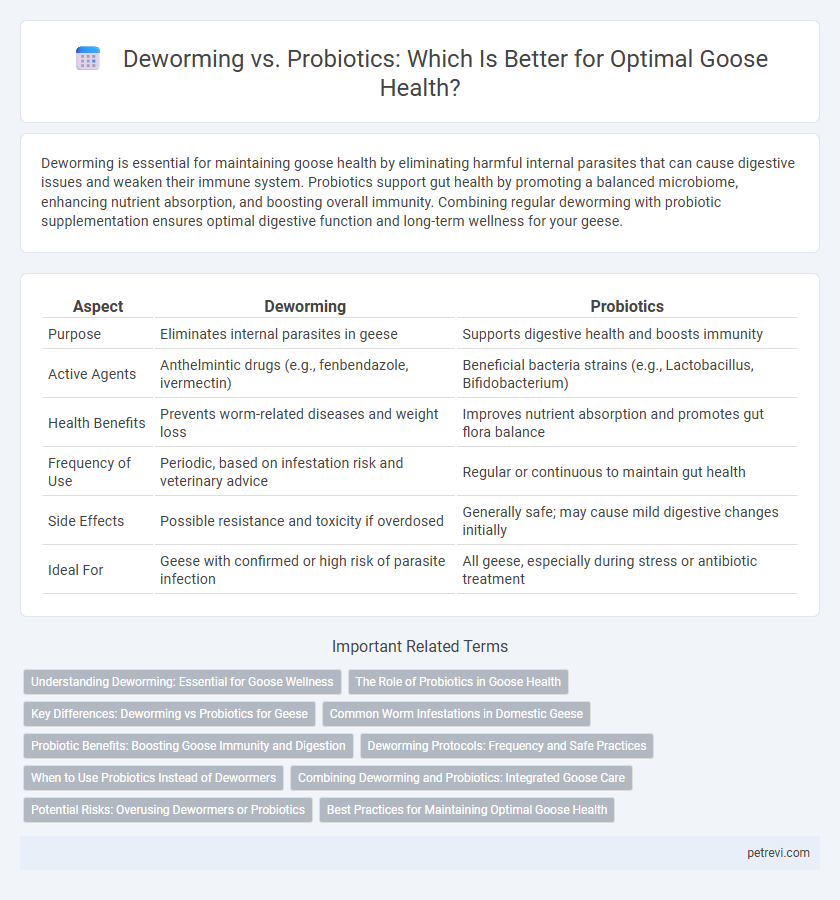Deworming is essential for maintaining goose health by eliminating harmful internal parasites that can cause digestive issues and weaken their immune system. Probiotics support gut health by promoting a balanced microbiome, enhancing nutrient absorption, and boosting overall immunity. Combining regular deworming with probiotic supplementation ensures optimal digestive function and long-term wellness for your geese.
Table of Comparison
| Aspect | Deworming | Probiotics |
|---|---|---|
| Purpose | Eliminates internal parasites in geese | Supports digestive health and boosts immunity |
| Active Agents | Anthelmintic drugs (e.g., fenbendazole, ivermectin) | Beneficial bacteria strains (e.g., Lactobacillus, Bifidobacterium) |
| Health Benefits | Prevents worm-related diseases and weight loss | Improves nutrient absorption and promotes gut flora balance |
| Frequency of Use | Periodic, based on infestation risk and veterinary advice | Regular or continuous to maintain gut health |
| Side Effects | Possible resistance and toxicity if overdosed | Generally safe; may cause mild digestive changes initially |
| Ideal For | Geese with confirmed or high risk of parasite infection | All geese, especially during stress or antibiotic treatment |
Understanding Deworming: Essential for Goose Wellness
Deworming is essential for maintaining goose health by eliminating internal parasites that can cause weight loss, anemia, and reduced egg production. Effective deworming protocols target common parasites like roundworms and gapeworms, ensuring the digestive system remains unhindered. Regular monitoring and strategic deworming complement probiotics, which support gut flora but cannot remove parasitic infections.
The Role of Probiotics in Goose Health
Probiotics play a crucial role in maintaining optimal gut health for geese by promoting a balanced intestinal microbiota and enhancing nutrient absorption. Regular administration of probiotics can reduce the incidence of digestive disorders and improve immune responses, supporting overall vitality. Unlike deworming treatments that target parasitic infections, probiotics focus on sustaining beneficial bacteria populations essential for long-term gastrointestinal function.
Key Differences: Deworming vs Probiotics for Geese
Deworming for geese primarily targets internal parasites such as roundworms and tapeworms, using anthelmintic medications to eliminate infestations and improve overall health and nutrient absorption. Probiotics focus on maintaining or restoring a healthy gut microbiome by promoting beneficial bacteria, enhancing digestion, immune response, and disease resistance. While deworming is a reactive treatment addressing parasitic infections, probiotics serve as a preventive measure supporting digestive health and optimizing nutrient utilization in geese.
Common Worm Infestations in Domestic Geese
Common worm infestations in domestic geese primarily include roundworms, gapeworms, and tapeworms, which can cause respiratory issues, weight loss, and decreased egg production. Deworming with anthelmintic medications such as fenbendazole or ivermectin effectively eliminates these parasites, improving overall health and growth rates. Probiotics support gut flora balance and enhance immune function but do not replace the need for targeted deworming treatments in managing worm infestations in geese.
Probiotic Benefits: Boosting Goose Immunity and Digestion
Probiotics enhance goose immunity by promoting a balanced gut microbiota, which helps prevent pathogenic infections and supports overall health. These beneficial bacteria improve digestion efficiency, aiding nutrient absorption and reducing gastrointestinal issues commonly seen in geese. Unlike deworming, which targets specific parasites, probiotics offer a holistic approach to maintaining long-term gut health and immune resilience in geese.
Deworming Protocols: Frequency and Safe Practices
Effective deworming protocols for geese typically involve administering anthelmintic treatments every 3 to 6 months, depending on parasite load and environmental conditions. Safe practices include consulting a veterinarian for accurate dosing, avoiding overuse to prevent resistance, and combining with proper pasture management to reduce reinfection risks. Regular fecal examinations help determine the optimal frequency for deworming and ensure monitoring of parasite control effectiveness.
When to Use Probiotics Instead of Dewormers
Probiotics are beneficial for maintaining the digestive health of geese, particularly during stress periods such as after antibiotic treatment or dietary changes, helping to restore gut flora balance. Dewormers should be reserved for confirmed parasitic infections diagnosed through fecal examinations, as their overuse can lead to resistance and disrupt beneficial gut bacteria. Using probiotics instead of dewormers is advisable when promoting overall digestive wellness without the presence of parasites, ensuring optimal nutrient absorption and immune support in geese.
Combining Deworming and Probiotics: Integrated Goose Care
Combining deworming and probiotics enhances goose health by targeting intestinal parasites while restoring beneficial gut flora, thus improving nutrient absorption and immune function. Deworming eliminates harmful worms that cause digestive disruptions, whereas probiotics promote a balanced microbiome, reducing the risk of secondary infections. Integrated care protocols incorporating both treatments optimize growth rates, reduce mortality, and support overall flock vitality in commercial and domestic geese.
Potential Risks: Overusing Dewormers or Probiotics
Excessive use of dewormers in geese can lead to parasite resistance, reducing treatment effectiveness and causing potential toxicity. Overuse of probiotics may disrupt the natural gut microbiota balance, resulting in digestive issues or weakened immune response. Monitoring dosages and consulting a veterinarian are crucial to maintaining optimal goose health.
Best Practices for Maintaining Optimal Goose Health
Deworming is essential for eliminating internal parasites that can compromise a goose's digestive efficiency and overall health, while probiotics enhance gut flora balance to improve nutrient absorption and immune response. Regular fecal exams combined with strategic deworming schedules tailored to local parasite prevalence ensure effective parasite control without disrupting beneficial gut bacteria. Integrating probiotics after deworming supports intestinal recovery, maintaining optimal digestion and reducing the risk of secondary infections in geese.
Deworming vs Probiotics for Goose Health Infographic

 petrevi.com
petrevi.com